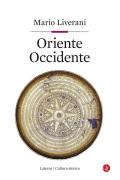Oriente Occidente

The West has always seen the heroic struggle of little Greece against the Persian Empire as the symbol of its own moral and cultural superiority over Eastern despotism. Yet those wars represented only a moment in a thousand-year relationship, reconstructed here, in an original and innovative form, by one of the world's most important archaeologists.
Between East and West it seems that a real clash of civilizations has always existed. In our imagination, the Persian wars for centuries have symbolized precisely this: the perennial struggle between Eastern despotism and Western freedom. Just think of the 300 people from Thermopylae who heroically resisted the invasion of the vast masses of the Great King. On the contrary, for a very long period, starting from the very ancient Mesopotamian civilizations, our (European) West was a sort of appendix to the great Eastern (Asian) complex. Even at the time of the Persian Wars, the great empire saw Greece as a marginal problem. It was precisely those conflicts that transformed the weights on the scale: their outcome gave Greece the strength not only to resist, but rather to react and finally prevail. Given the enormous differences in military power, demographic base, dominating tradition, between the great empire and little Greece, it was obvious for the Western world to build its image as qualitatively superior, bringing out the values of democracy against oriental despotism, of freedoms against generalized enslavement, of individualities against ethnic subjugation.